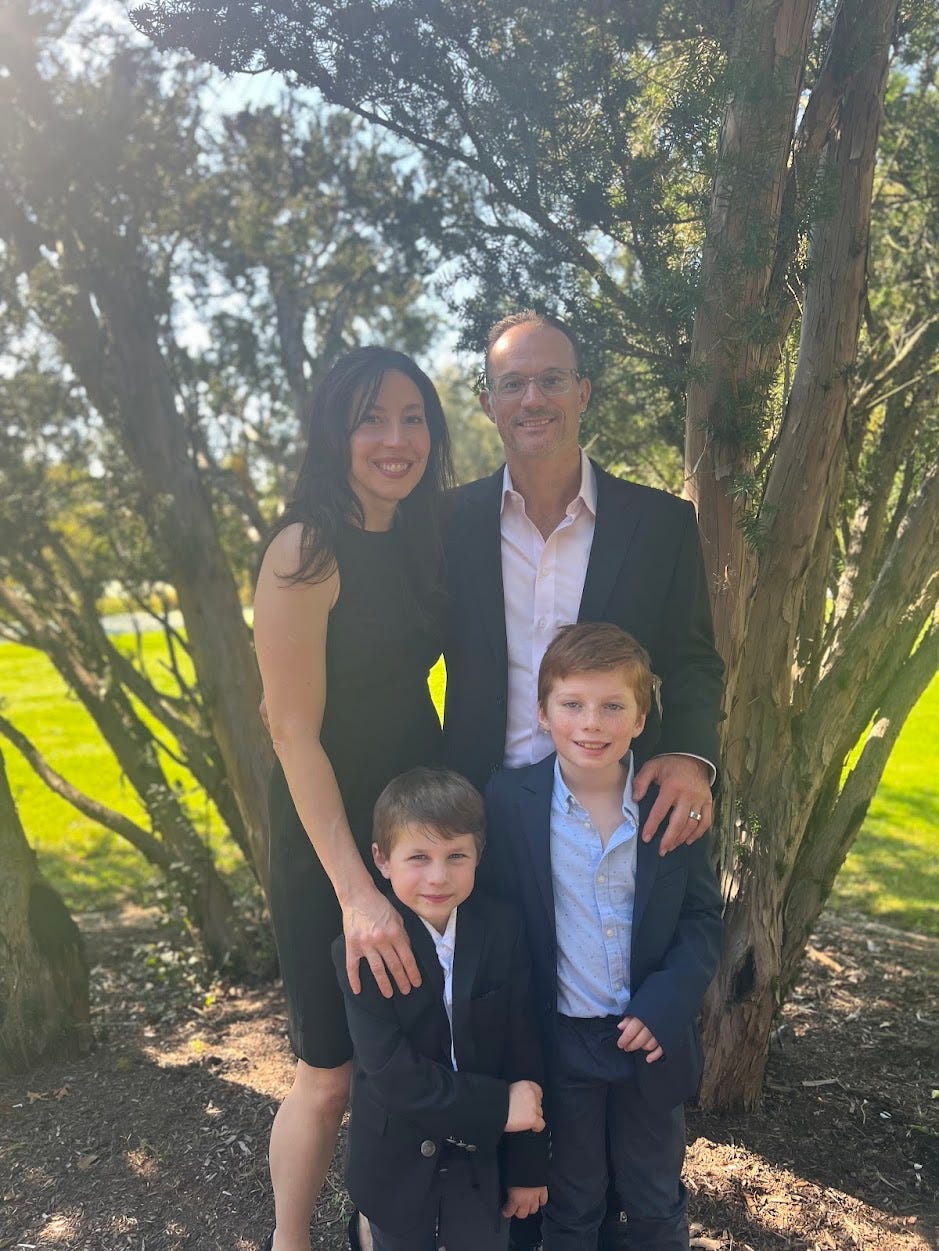🔥Welcome to Volume #00117!🔥
I’m Christian Champ. This is ☯️The Middle Way Newsletter ☯️. It is a place where I write, explore, share, and invite you along for the journey.
If you enjoy the newsletter, please share it with your friends.
🍳Why We Need to Create the Right Conditions 🍳
Thump!
Tears began to form. Red marks immediately followed on my youngest son's face. As soon as the ball left my hands, I said to myself oh no.
The newly gifted Steeler's football went through his hands, smashing into his cheek. The Christmas throw fell incomplete.
"Please put your hands up to catch the ball," I yelled. He wanted to let the crying happen but held back because he knew he pulled his hands back.
He needed to learn to catch the ball with his hands, which was not his preferred method of using his body. If he couldn't catch with his hands, he would have no chance to catch any balls when matched up against his older brother. Most kids learn this method of catching later, but he needed it now (this video shows the technique we are talking about).
He faced the same challenge we all encounter when trying something new: how to create the right conditions for success.
As the calendar turns over and we think about what we want to accomplish in the new year, creating the conditions for that accomplishment mirrors our Christmas-catching challenge.
We spent the day trying to devise a solution for his tendency to use his body to catch the ball. At the same time, we wanted to decrease the ball to the face risk by having him in the ready position to catch the ball.
Isaac and I remedied his challenges by creating a game where it counts as a catch if he catches the ball with his hands up in a triangle. It doesn't count as a miss if he has the triangle up but drops the ball. If he misses with his hands down or catches the ball with his body, we count it as a miss. Then we worked our way up to twenty catches in a row. I then increased the speed and distance of my passes as his performance improved (or decreased if he struggled).
We aren't there yet, but he continues to improve. Earlier this week, he caught almost every ball thrown with his hands.
The question is how we can create conditions to help us grow. What are the catches that we need to practice? How can we set up a game to get the repetitions we need?
How do we gamify the things we want to improve and work on? What repetitions must we do to ensure we catch balls with our hands and not our faces?
The new year is the perfect time to pick things to work on. Like catching a football, progress isn't about avoiding mistakes—it's about showing up, adjusting, and playing games until we win by adding new skills.
The easiest way to grow is to create the conditions that lead to our desired outcomes.
🧠Things to Think About🧠
Simon Sarris writes about how School is Not Enough for kids
He asks if childhood is still useful. Kids used to be out doing things that matter much earlier in life.
When I read biographies, early lives leap out the most. Leonardo da Vinci was a studio apprentice to Verrocchio at 14 years old. Walt Disney took on a number of jobs, chiefly delivering papers, by 11. Vladimir Nabokov published his first poetry collection at 16, while still in school. Andrew Carnegie finished schooling at 12 and was 13 when he began his second job as a telegraph office boy, where he convinced his superiors to teach him the telegraph machine itself. By 16, he was the family’s mainstay of income.
What we want to teach kids is agency…the capacity to act. Learning comes from action and mastery.
Agency is the capacity to act. Gaining agency is gaining the capacity to do something different from the rigid path of events that simply happen to you. Remarkable people typically go off-script early, usually in more than one way. Carnegie becoming a telegraph message boy is one opportunity; asking how to operate the telegraph is another. He was handed the first one, but he had to ask for the second. Da Vinci had plenty of small-time commissions, but he quit them all in favor of offering his services to the Duke of Milan.
We need to break the default scripts that have been put in place.
In these old biographies I find it interesting just how early and varied the avenues were that allowed promising adolescents to pivot off-script, and do something different than everyone else. For a 13-year-old today, what is the equivalent of being a telegraph office boy where one can learn technology while contributing? What about for a 16-year-old? What is today’s equivalent of becoming Verrocchio’s studio apprentice at 14?
Where are the studios, anyway?
He reminds everyone that “learning is simply the consequences of doing”. Even more so for our kids, mentors, and future generations.
Writers and Non-Writers by Paul Graham
PG worries about what happens with AI and writing.
I use it to check my work, give me feedback and try to think better.
The result will be a world divided into writes and write-nots. There will still be some people who can write. Some of us like it. But the middle ground between those who are good at writing and those who can't write at all will disappear. Instead of good writers, ok writers, and people who can't write, there will just be good writers and people who can't write.
Is that so bad? Isn't it common for skills to disappear when technology makes them obsolete? There aren't many blacksmiths left, and it doesn't seem to be a problem.
Yes, it's bad. The reason is something I mentioned earlier: writing is thinking. In fact there's a kind of thinking that can only be done by writing. You can't make this point better than Leslie Lamport did: “If you're thinking without writing, you only think you're thinking.”So a world divided into writes and write-nots is more dangerous than it sounds. It will be a world of thinks and think-nots. I know which half I want to be in, and I bet you do too.
Tom Morgan on Where is all the Money in Personal Transformation?
Tom wonders why something that fits a crucial need, and yet it is a challenging space to offer services.
Now I’m in my mid 40s, many people I know have reached the top of their own personal “success mountain” and are looking around for what’s next. Once you’ve hit that peak, virtually no amount of material success will make you any happier. So one healthy approach is to pursue the path of personal transformation. The relationship of money to that path is incredibly interesting.
He lists three containers we need: 1. Individual, 2. Relational and 3. Communal.
🎧Things to Listen, See, and Watch 🎧
Marci researches the power of fandom to unite and bring meaning, including the religious power of the Steelers to create community and transcend daily life.
The Pittsburgh Steelers fandom exemplifies a quasi-religious devotion, with symbols like the Terrible Towel fostering deep emotional bonds among fans.
Shared game day experiences among Steelers supporters illustrate how sports create community ties and collective identity that transcend mere entertainment.
💣Words of Wisdom💣
"If breakthroughs could be bought, then the rich would buy them. Instead, passion, persistence, belief, and ingenuity are required to invent new things, qualities the poor and young often have in abundance. Stay hungry." (Kevin Kelly, Excellent Advice for Living)
"I tried to imagine what I might tell my own son someday. The words came to my mind almost instantly: “People who do great things don’t wait until the time is right. They make the time.”" (Matthew Dicks and Elysha Dicks, Someday Is Today)
"The combination of gradual improvements and random shocks turns out to be a very effective way to approach a host of difficult problems." (Tim Harford, Messy)
"As Harvard psychology professor Dan Gilbert points out, “Human beings are works in progress that mistakenly think they’re finished.”” (Michael Gervais, The First Rule of Mastery)
"The dynamic of our society, and particularly our new economy, will increasingly obey the logic of networks. Understanding how networks work will be the key to understanding how the economy works." (Kevin Kelly, New Rules for the New Economy)
"Leaning back in my recliner each night, staring at the ceiling, I tried to settle myself. I told myself: Life is growth. You grow or you die." (Phil Knight, Shoe Dog)”
"Every life has its trials and tribulations. We can navigate them more skillfully when we don’t waste time and energy shooting ourselves with a second arrow—such as dwelling on how much greener the grass in our neighbor’s yard looks, compared to ours." (Thich Nhat Hanh)
“Each person is a mystery. And when you are surrounded by mysteries, as the saying goes, it's best to live life in the form of a question." (David Brooks, How to Know a Person)
"Is anything more valuable to a company than the way its people spend their energies?" (Robert Kegan, Lisa Laskow Lahey, An Everyone Culture)
"Plenty of talented athletes don't make the cut. Plenty of talented athletes don't find their edge. The way you get an edge, Bill Belichick told me, "is by being coachable" (Paul Rabil, The Way of the Champion)
"Discipline is not tested by sticking to a routine, it’s tested by your response to challenges." (Chris Wojcik, The Hard Truth About Discipline)
"As Richard Branson has written, "Intention in its very essence is a futuristic act."" (Sally Jenkins, The Right Call)
"It is possible to love oneself and love others; to take care of one's own needs while making the world a better place; to be profitable and generous." (John Mackey, The Whole Story)
🙏Thanks for Reading🙏
What conditions do we need to create? How can we play games that teach us the lessons we want to learn?
Namaste,
Christian












